Foundation Year Portfolio: Reflecting on Self and Society (IF3058)
VerifiedAdded on 2021/04/21
|10
|2071
|173
Portfolio
AI Summary
This portfolio, submitted by a student, explores the themes of self and society through a series of tasks. Task 1 focuses on identity, including a visual representation and SWOT analysis to assess strengths, weaknesses, opportunities, and threats. Task 2 presents lecture notes, a summary, and a reflection on Margaret Heffernan's talk about workplace dynamics, along with a follow-up on Tom Wujec's talk. Task 4 reflects on the individual and society, drawing on class notes about career paths in social care, and a reflection on the student's learning process using Kolb's experiential learning cycle. The portfolio demonstrates an understanding of key concepts and critical thinking through analysis and reflection, referencing relevant sources to support the arguments and ideas presented.
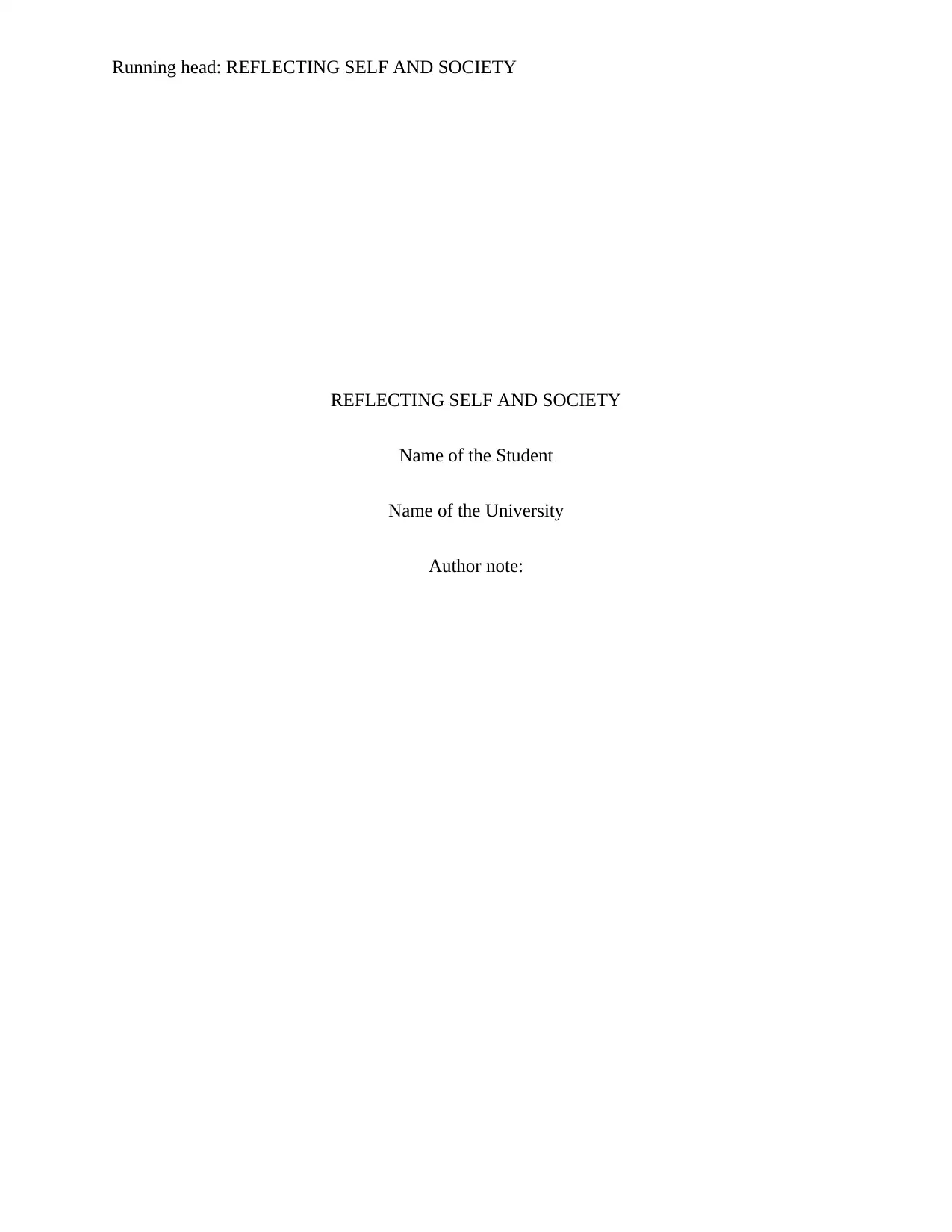
Running head: REFLECTING SELF AND SOCIETY
REFLECTING SELF AND SOCIETY
Name of the Student
Name of the University
Author note:
REFLECTING SELF AND SOCIETY
Name of the Student
Name of the University
Author note:
Paraphrase This Document
Need a fresh take? Get an instant paraphrase of this document with our AI Paraphraser
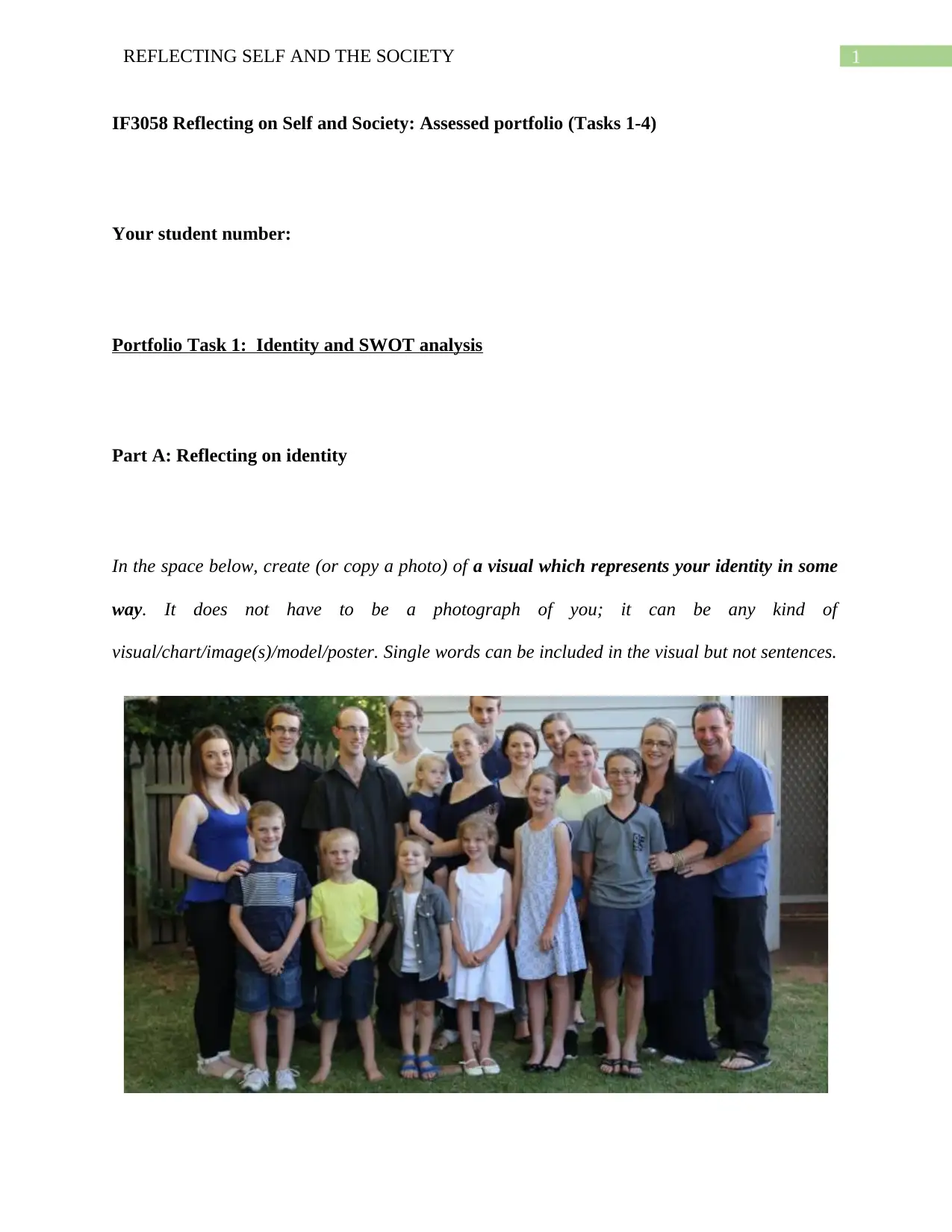
1REFLECTING SELF AND THE SOCIETY
IF3058 Reflecting on Self and Society: Assessed portfolio (Tasks 1-4)
Your student number:
Portfolio Task 1: Identity and SWOT analysis
Part A: Reflecting on identity
In the space below, create (or copy a photo) of a visual which represents your identity in some
way. It does not have to be a photograph of you; it can be any kind of
visual/chart/image(s)/model/poster. Single words can be included in the visual but not sentences.
IF3058 Reflecting on Self and Society: Assessed portfolio (Tasks 1-4)
Your student number:
Portfolio Task 1: Identity and SWOT analysis
Part A: Reflecting on identity
In the space below, create (or copy a photo) of a visual which represents your identity in some
way. It does not have to be a photograph of you; it can be any kind of
visual/chart/image(s)/model/poster. Single words can be included in the visual but not sentences.
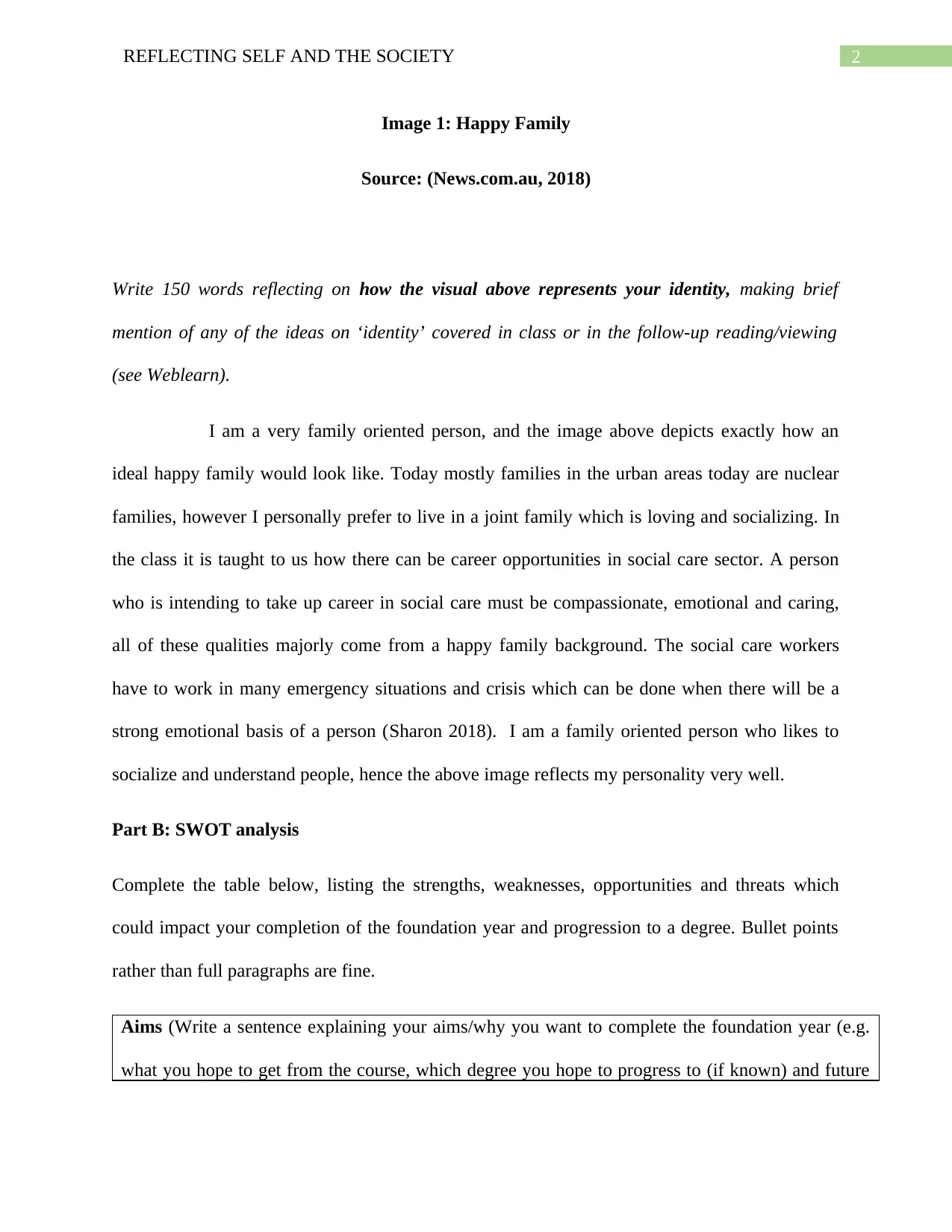
2REFLECTING SELF AND THE SOCIETY
Image 1: Happy Family
Source: (News.com.au, 2018)
Write 150 words reflecting on how the visual above represents your identity, making brief
mention of any of the ideas on ‘identity’ covered in class or in the follow-up reading/viewing
(see Weblearn).
I am a very family oriented person, and the image above depicts exactly how an
ideal happy family would look like. Today mostly families in the urban areas today are nuclear
families, however I personally prefer to live in a joint family which is loving and socializing. In
the class it is taught to us how there can be career opportunities in social care sector. A person
who is intending to take up career in social care must be compassionate, emotional and caring,
all of these qualities majorly come from a happy family background. The social care workers
have to work in many emergency situations and crisis which can be done when there will be a
strong emotional basis of a person (Sharon 2018). I am a family oriented person who likes to
socialize and understand people, hence the above image reflects my personality very well.
Part B: SWOT analysis
Complete the table below, listing the strengths, weaknesses, opportunities and threats which
could impact your completion of the foundation year and progression to a degree. Bullet points
rather than full paragraphs are fine.
Aims (Write a sentence explaining your aims/why you want to complete the foundation year (e.g.
what you hope to get from the course, which degree you hope to progress to (if known) and future
Image 1: Happy Family
Source: (News.com.au, 2018)
Write 150 words reflecting on how the visual above represents your identity, making brief
mention of any of the ideas on ‘identity’ covered in class or in the follow-up reading/viewing
(see Weblearn).
I am a very family oriented person, and the image above depicts exactly how an
ideal happy family would look like. Today mostly families in the urban areas today are nuclear
families, however I personally prefer to live in a joint family which is loving and socializing. In
the class it is taught to us how there can be career opportunities in social care sector. A person
who is intending to take up career in social care must be compassionate, emotional and caring,
all of these qualities majorly come from a happy family background. The social care workers
have to work in many emergency situations and crisis which can be done when there will be a
strong emotional basis of a person (Sharon 2018). I am a family oriented person who likes to
socialize and understand people, hence the above image reflects my personality very well.
Part B: SWOT analysis
Complete the table below, listing the strengths, weaknesses, opportunities and threats which
could impact your completion of the foundation year and progression to a degree. Bullet points
rather than full paragraphs are fine.
Aims (Write a sentence explaining your aims/why you want to complete the foundation year (e.g.
what you hope to get from the course, which degree you hope to progress to (if known) and future
⊘ This is a preview!⊘
Do you want full access?
Subscribe today to unlock all pages.

Trusted by 1+ million students worldwide
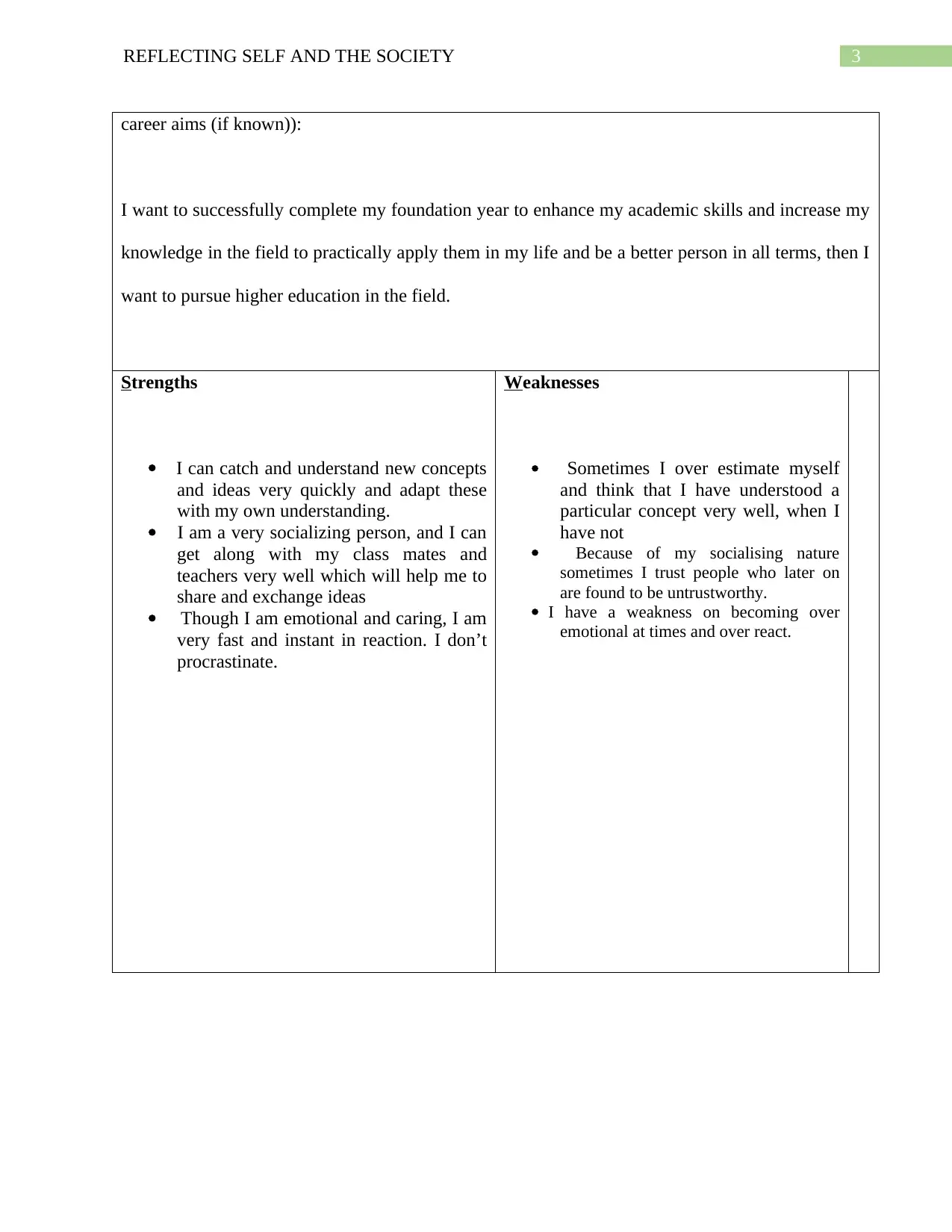
3REFLECTING SELF AND THE SOCIETY
career aims (if known)):
I want to successfully complete my foundation year to enhance my academic skills and increase my
knowledge in the field to practically apply them in my life and be a better person in all terms, then I
want to pursue higher education in the field.
Strengths
I can catch and understand new concepts
and ideas very quickly and adapt these
with my own understanding.
I am a very socializing person, and I can
get along with my class mates and
teachers very well which will help me to
share and exchange ideas
Though I am emotional and caring, I am
very fast and instant in reaction. I don’t
procrastinate.
Weaknesses
Sometimes I over estimate myself
and think that I have understood a
particular concept very well, when I
have not
Because of my socialising nature
sometimes I trust people who later on
are found to be untrustworthy.
I have a weakness on becoming over
emotional at times and over react.
career aims (if known)):
I want to successfully complete my foundation year to enhance my academic skills and increase my
knowledge in the field to practically apply them in my life and be a better person in all terms, then I
want to pursue higher education in the field.
Strengths
I can catch and understand new concepts
and ideas very quickly and adapt these
with my own understanding.
I am a very socializing person, and I can
get along with my class mates and
teachers very well which will help me to
share and exchange ideas
Though I am emotional and caring, I am
very fast and instant in reaction. I don’t
procrastinate.
Weaknesses
Sometimes I over estimate myself
and think that I have understood a
particular concept very well, when I
have not
Because of my socialising nature
sometimes I trust people who later on
are found to be untrustworthy.
I have a weakness on becoming over
emotional at times and over react.
Paraphrase This Document
Need a fresh take? Get an instant paraphrase of this document with our AI Paraphraser
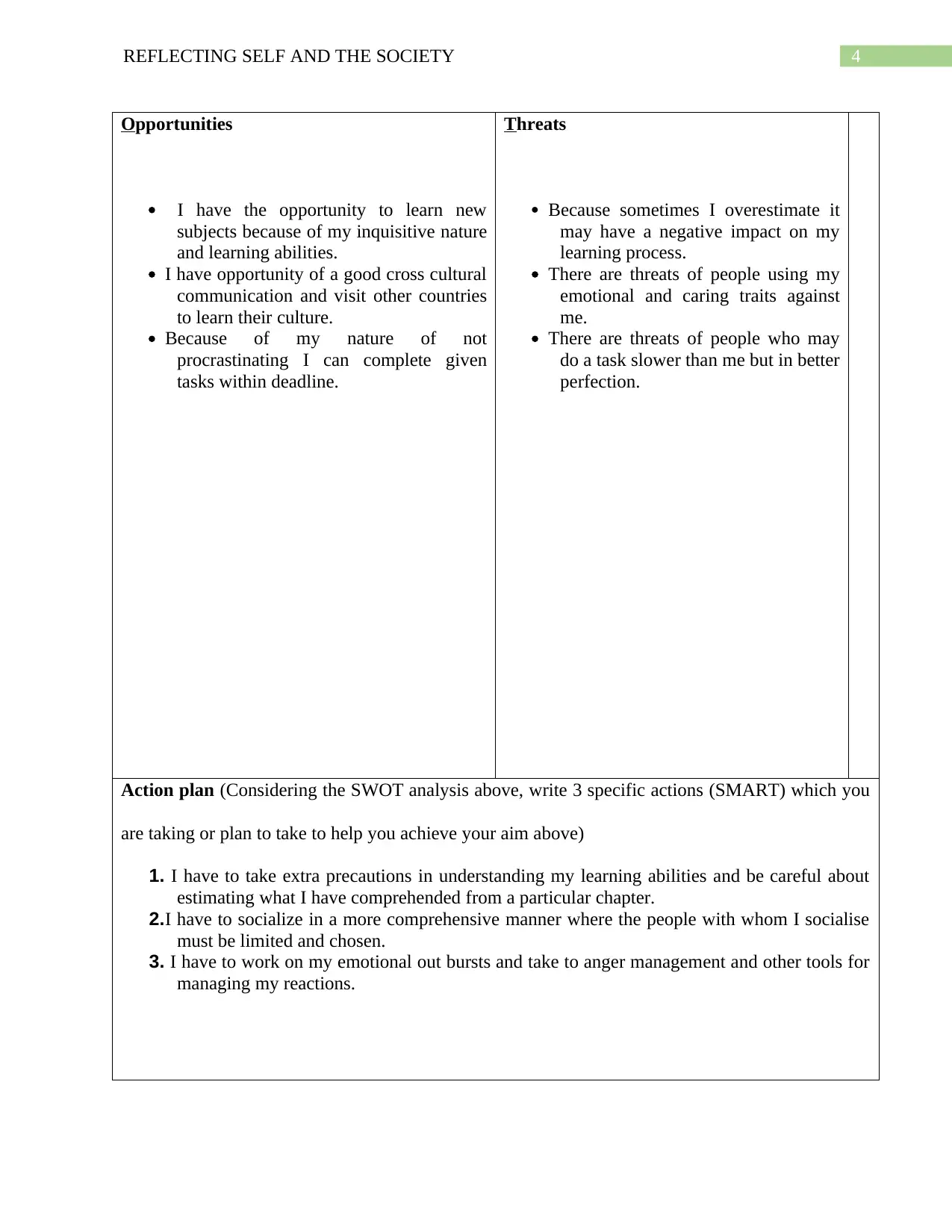
4REFLECTING SELF AND THE SOCIETY
Opportunities
I have the opportunity to learn new
subjects because of my inquisitive nature
and learning abilities.
I have opportunity of a good cross cultural
communication and visit other countries
to learn their culture.
Because of my nature of not
procrastinating I can complete given
tasks within deadline.
Threats
Because sometimes I overestimate it
may have a negative impact on my
learning process.
There are threats of people using my
emotional and caring traits against
me.
There are threats of people who may
do a task slower than me but in better
perfection.
Action plan (Considering the SWOT analysis above, write 3 specific actions (SMART) which you
are taking or plan to take to help you achieve your aim above)
1. I have to take extra precautions in understanding my learning abilities and be careful about
estimating what I have comprehended from a particular chapter.
2.I have to socialize in a more comprehensive manner where the people with whom I socialise
must be limited and chosen.
3. I have to work on my emotional out bursts and take to anger management and other tools for
managing my reactions.
Opportunities
I have the opportunity to learn new
subjects because of my inquisitive nature
and learning abilities.
I have opportunity of a good cross cultural
communication and visit other countries
to learn their culture.
Because of my nature of not
procrastinating I can complete given
tasks within deadline.
Threats
Because sometimes I overestimate it
may have a negative impact on my
learning process.
There are threats of people using my
emotional and caring traits against
me.
There are threats of people who may
do a task slower than me but in better
perfection.
Action plan (Considering the SWOT analysis above, write 3 specific actions (SMART) which you
are taking or plan to take to help you achieve your aim above)
1. I have to take extra precautions in understanding my learning abilities and be careful about
estimating what I have comprehended from a particular chapter.
2.I have to socialize in a more comprehensive manner where the people with whom I socialise
must be limited and chosen.
3. I have to work on my emotional out bursts and take to anger management and other tools for
managing my reactions.
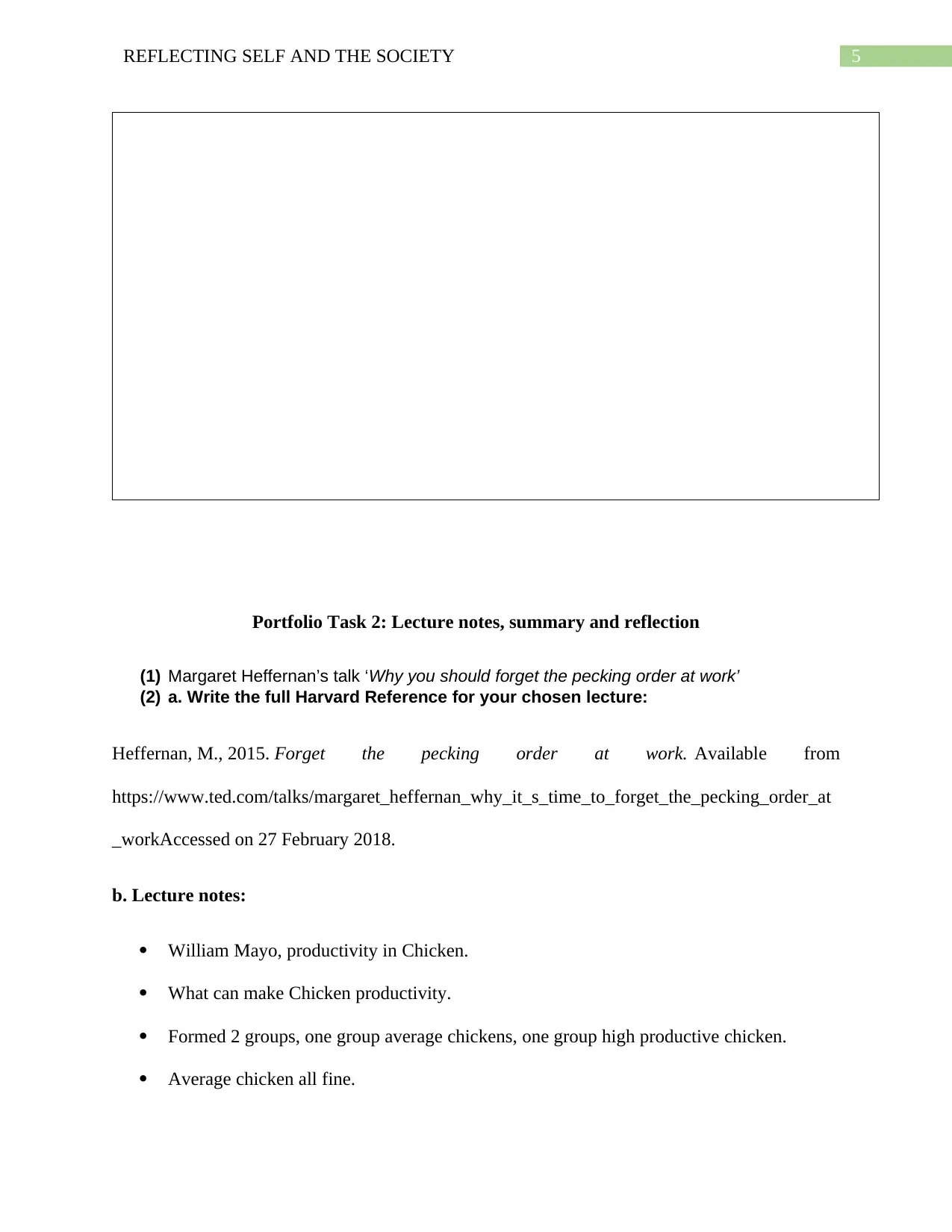
5REFLECTING SELF AND THE SOCIETY
Portfolio Task 2: Lecture notes, summary and reflection
(1) Margaret Heffernan’s talk ‘Why you should forget the pecking order at work’
(2) a. Write the full Harvard Reference for your chosen lecture:
Heffernan, M., 2015. Forget the pecking order at work. Available from
https://www.ted.com/talks/margaret_heffernan_why_it_s_time_to_forget_the_pecking_order_at
_workAccessed on 27 February 2018.
b. Lecture notes:
William Mayo, productivity in Chicken.
What can make Chicken productivity.
Formed 2 groups, one group average chickens, one group high productive chicken.
Average chicken all fine.
Portfolio Task 2: Lecture notes, summary and reflection
(1) Margaret Heffernan’s talk ‘Why you should forget the pecking order at work’
(2) a. Write the full Harvard Reference for your chosen lecture:
Heffernan, M., 2015. Forget the pecking order at work. Available from
https://www.ted.com/talks/margaret_heffernan_why_it_s_time_to_forget_the_pecking_order_at
_workAccessed on 27 February 2018.
b. Lecture notes:
William Mayo, productivity in Chicken.
What can make Chicken productivity.
Formed 2 groups, one group average chickens, one group high productive chicken.
Average chicken all fine.
⊘ This is a preview!⊘
Do you want full access?
Subscribe today to unlock all pages.

Trusted by 1+ million students worldwide
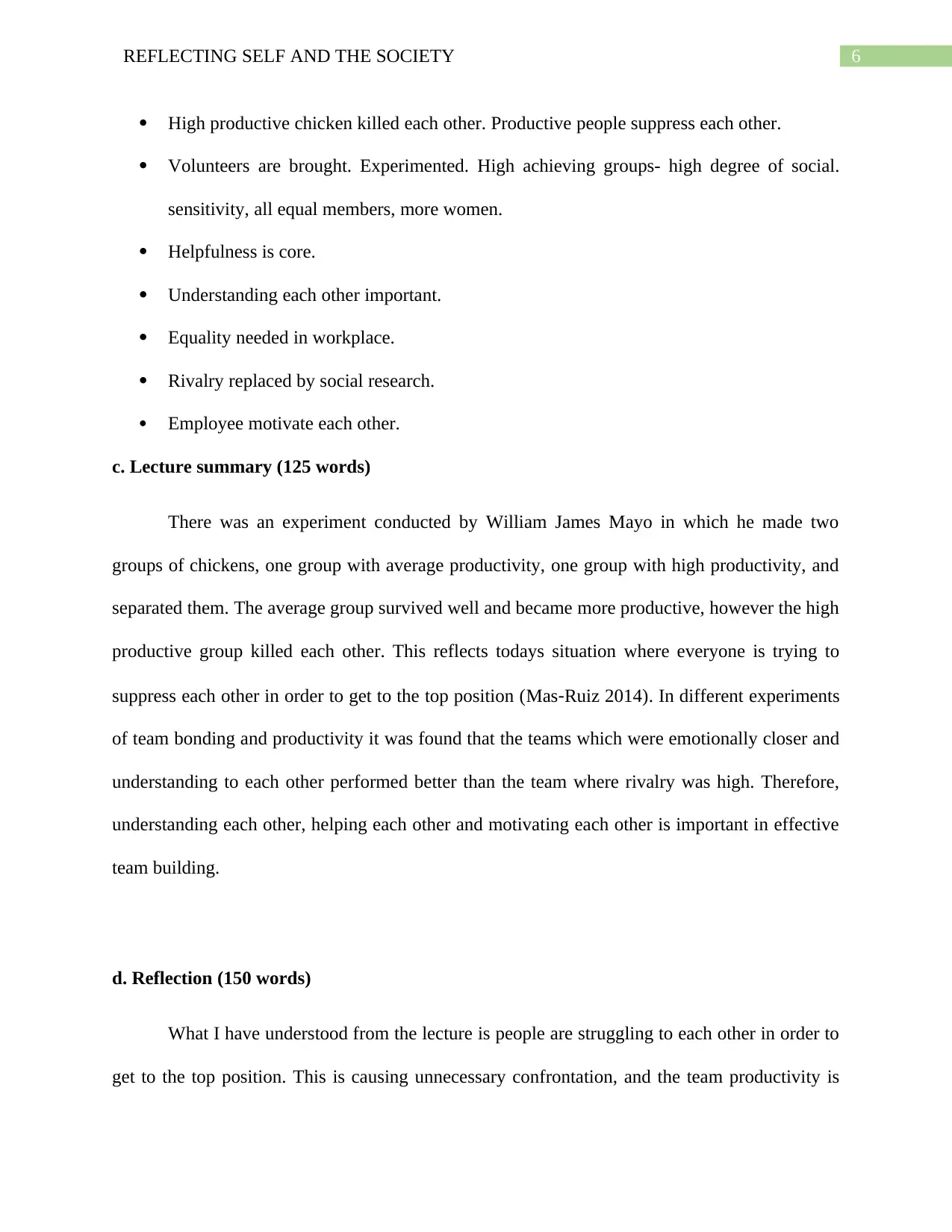
6REFLECTING SELF AND THE SOCIETY
High productive chicken killed each other. Productive people suppress each other.
Volunteers are brought. Experimented. High achieving groups- high degree of social.
sensitivity, all equal members, more women.
Helpfulness is core.
Understanding each other important.
Equality needed in workplace.
Rivalry replaced by social research.
Employee motivate each other.
c. Lecture summary (125 words)
There was an experiment conducted by William James Mayo in which he made two
groups of chickens, one group with average productivity, one group with high productivity, and
separated them. The average group survived well and became more productive, however the high
productive group killed each other. This reflects todays situation where everyone is trying to
suppress each other in order to get to the top position (Mas‐Ruiz 2014). In different experiments
of team bonding and productivity it was found that the teams which were emotionally closer and
understanding to each other performed better than the team where rivalry was high. Therefore,
understanding each other, helping each other and motivating each other is important in effective
team building.
d. Reflection (150 words)
What I have understood from the lecture is people are struggling to each other in order to
get to the top position. This is causing unnecessary confrontation, and the team productivity is
High productive chicken killed each other. Productive people suppress each other.
Volunteers are brought. Experimented. High achieving groups- high degree of social.
sensitivity, all equal members, more women.
Helpfulness is core.
Understanding each other important.
Equality needed in workplace.
Rivalry replaced by social research.
Employee motivate each other.
c. Lecture summary (125 words)
There was an experiment conducted by William James Mayo in which he made two
groups of chickens, one group with average productivity, one group with high productivity, and
separated them. The average group survived well and became more productive, however the high
productive group killed each other. This reflects todays situation where everyone is trying to
suppress each other in order to get to the top position (Mas‐Ruiz 2014). In different experiments
of team bonding and productivity it was found that the teams which were emotionally closer and
understanding to each other performed better than the team where rivalry was high. Therefore,
understanding each other, helping each other and motivating each other is important in effective
team building.
d. Reflection (150 words)
What I have understood from the lecture is people are struggling to each other in order to
get to the top position. This is causing unnecessary confrontation, and the team productivity is
Paraphrase This Document
Need a fresh take? Get an instant paraphrase of this document with our AI Paraphraser
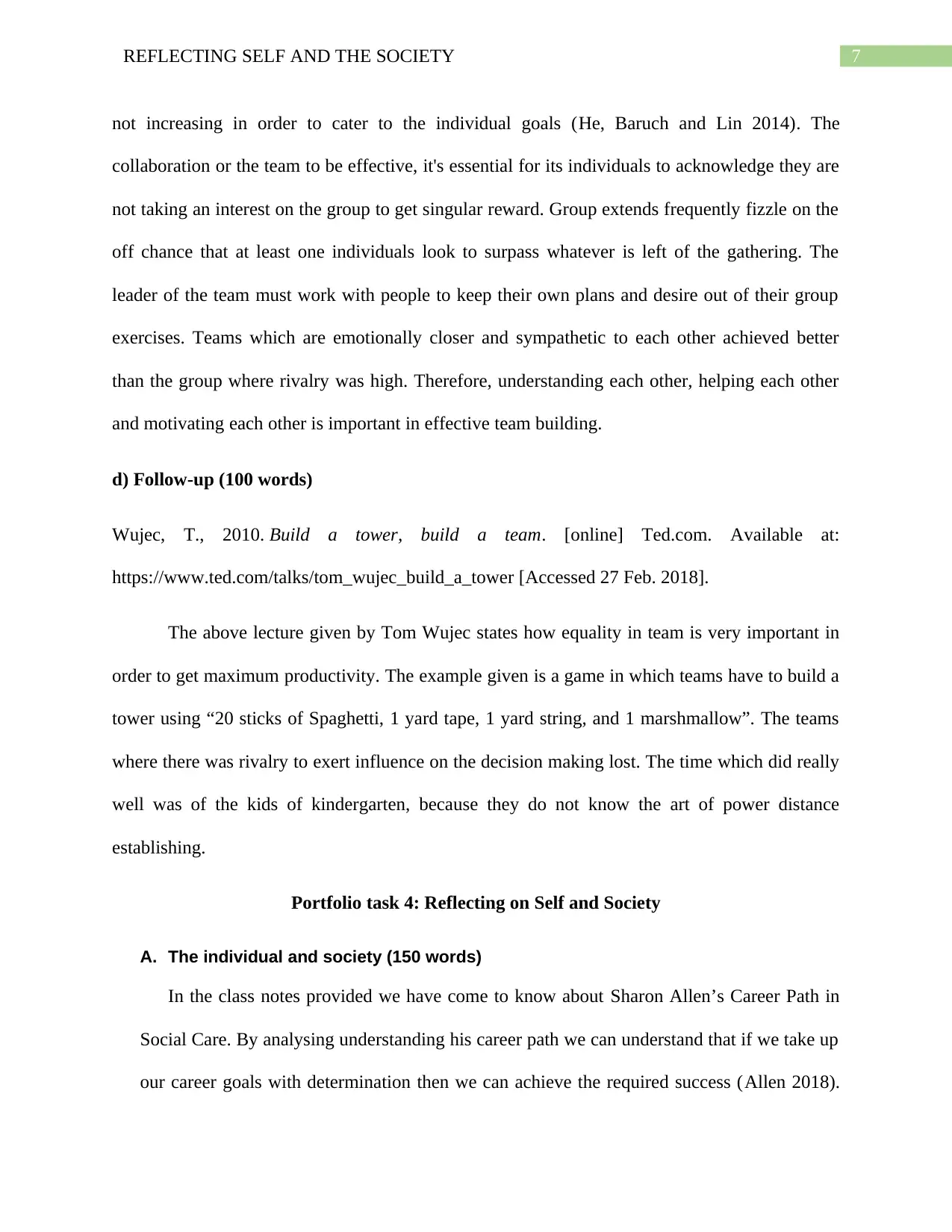
7REFLECTING SELF AND THE SOCIETY
not increasing in order to cater to the individual goals (He, Baruch and Lin 2014). The
collaboration or the team to be effective, it's essential for its individuals to acknowledge they are
not taking an interest on the group to get singular reward. Group extends frequently fizzle on the
off chance that at least one individuals look to surpass whatever is left of the gathering. The
leader of the team must work with people to keep their own plans and desire out of their group
exercises. Teams which are emotionally closer and sympathetic to each other achieved better
than the group where rivalry was high. Therefore, understanding each other, helping each other
and motivating each other is important in effective team building.
d) Follow-up (100 words)
Wujec, T., 2010. Build a tower, build a team. [online] Ted.com. Available at:
https://www.ted.com/talks/tom_wujec_build_a_tower [Accessed 27 Feb. 2018].
The above lecture given by Tom Wujec states how equality in team is very important in
order to get maximum productivity. The example given is a game in which teams have to build a
tower using “20 sticks of Spaghetti, 1 yard tape, 1 yard string, and 1 marshmallow”. The teams
where there was rivalry to exert influence on the decision making lost. The time which did really
well was of the kids of kindergarten, because they do not know the art of power distance
establishing.
Portfolio task 4: Reflecting on Self and Society
A. The individual and society (150 words)
In the class notes provided we have come to know about Sharon Allen’s Career Path in
Social Care. By analysing understanding his career path we can understand that if we take up
our career goals with determination then we can achieve the required success (Allen 2018).
not increasing in order to cater to the individual goals (He, Baruch and Lin 2014). The
collaboration or the team to be effective, it's essential for its individuals to acknowledge they are
not taking an interest on the group to get singular reward. Group extends frequently fizzle on the
off chance that at least one individuals look to surpass whatever is left of the gathering. The
leader of the team must work with people to keep their own plans and desire out of their group
exercises. Teams which are emotionally closer and sympathetic to each other achieved better
than the group where rivalry was high. Therefore, understanding each other, helping each other
and motivating each other is important in effective team building.
d) Follow-up (100 words)
Wujec, T., 2010. Build a tower, build a team. [online] Ted.com. Available at:
https://www.ted.com/talks/tom_wujec_build_a_tower [Accessed 27 Feb. 2018].
The above lecture given by Tom Wujec states how equality in team is very important in
order to get maximum productivity. The example given is a game in which teams have to build a
tower using “20 sticks of Spaghetti, 1 yard tape, 1 yard string, and 1 marshmallow”. The teams
where there was rivalry to exert influence on the decision making lost. The time which did really
well was of the kids of kindergarten, because they do not know the art of power distance
establishing.
Portfolio task 4: Reflecting on Self and Society
A. The individual and society (150 words)
In the class notes provided we have come to know about Sharon Allen’s Career Path in
Social Care. By analysing understanding his career path we can understand that if we take up
our career goals with determination then we can achieve the required success (Allen 2018).
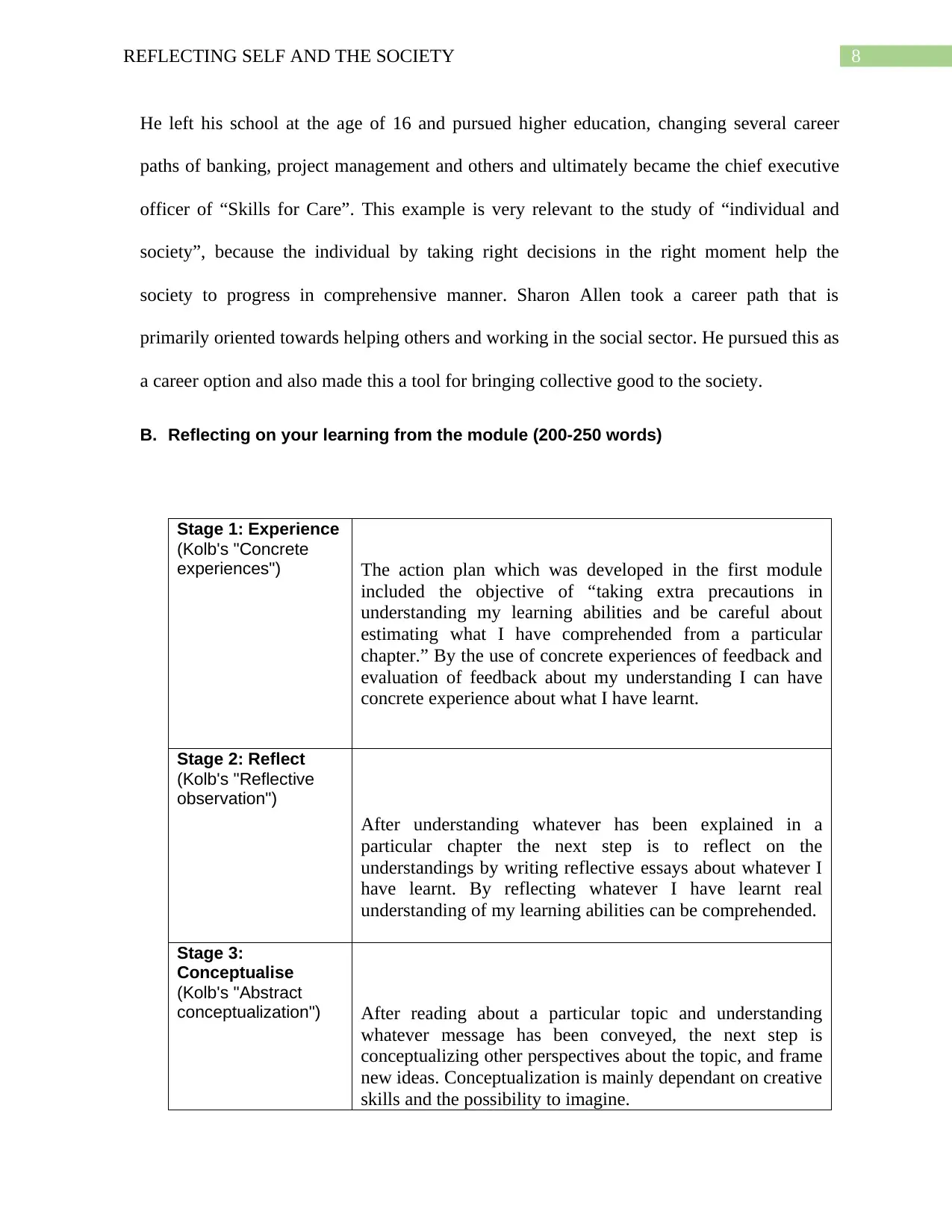
8REFLECTING SELF AND THE SOCIETY
He left his school at the age of 16 and pursued higher education, changing several career
paths of banking, project management and others and ultimately became the chief executive
officer of “Skills for Care”. This example is very relevant to the study of “individual and
society”, because the individual by taking right decisions in the right moment help the
society to progress in comprehensive manner. Sharon Allen took a career path that is
primarily oriented towards helping others and working in the social sector. He pursued this as
a career option and also made this a tool for bringing collective good to the society.
B. Reflecting on your learning from the module (200-250 words)
Stage 1: Experience
(Kolb's "Concrete
experiences") The action plan which was developed in the first module
included the objective of “taking extra precautions in
understanding my learning abilities and be careful about
estimating what I have comprehended from a particular
chapter.” By the use of concrete experiences of feedback and
evaluation of feedback about my understanding I can have
concrete experience about what I have learnt.
Stage 2: Reflect
(Kolb's "Reflective
observation")
After understanding whatever has been explained in a
particular chapter the next step is to reflect on the
understandings by writing reflective essays about whatever I
have learnt. By reflecting whatever I have learnt real
understanding of my learning abilities can be comprehended.
Stage 3:
Conceptualise
(Kolb's "Abstract
conceptualization") After reading about a particular topic and understanding
whatever message has been conveyed, the next step is
conceptualizing other perspectives about the topic, and frame
new ideas. Conceptualization is mainly dependant on creative
skills and the possibility to imagine.
He left his school at the age of 16 and pursued higher education, changing several career
paths of banking, project management and others and ultimately became the chief executive
officer of “Skills for Care”. This example is very relevant to the study of “individual and
society”, because the individual by taking right decisions in the right moment help the
society to progress in comprehensive manner. Sharon Allen took a career path that is
primarily oriented towards helping others and working in the social sector. He pursued this as
a career option and also made this a tool for bringing collective good to the society.
B. Reflecting on your learning from the module (200-250 words)
Stage 1: Experience
(Kolb's "Concrete
experiences") The action plan which was developed in the first module
included the objective of “taking extra precautions in
understanding my learning abilities and be careful about
estimating what I have comprehended from a particular
chapter.” By the use of concrete experiences of feedback and
evaluation of feedback about my understanding I can have
concrete experience about what I have learnt.
Stage 2: Reflect
(Kolb's "Reflective
observation")
After understanding whatever has been explained in a
particular chapter the next step is to reflect on the
understandings by writing reflective essays about whatever I
have learnt. By reflecting whatever I have learnt real
understanding of my learning abilities can be comprehended.
Stage 3:
Conceptualise
(Kolb's "Abstract
conceptualization") After reading about a particular topic and understanding
whatever message has been conveyed, the next step is
conceptualizing other perspectives about the topic, and frame
new ideas. Conceptualization is mainly dependant on creative
skills and the possibility to imagine.
⊘ This is a preview!⊘
Do you want full access?
Subscribe today to unlock all pages.

Trusted by 1+ million students worldwide
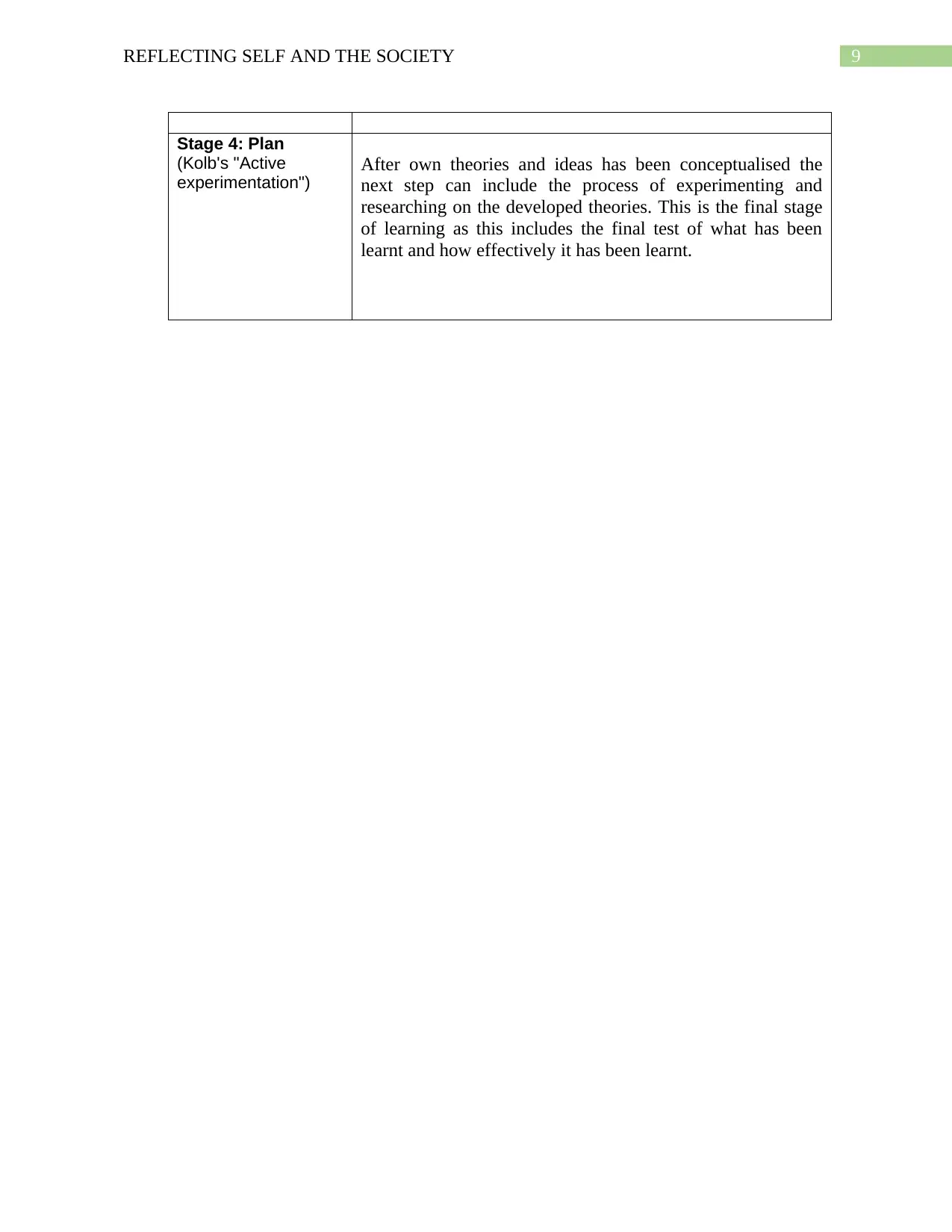
9REFLECTING SELF AND THE SOCIETY
Stage 4: Plan
(Kolb's "Active
experimentation")
After own theories and ideas has been conceptualised the
next step can include the process of experimenting and
researching on the developed theories. This is the final stage
of learning as this includes the final test of what has been
learnt and how effectively it has been learnt.
Stage 4: Plan
(Kolb's "Active
experimentation")
After own theories and ideas has been conceptualised the
next step can include the process of experimenting and
researching on the developed theories. This is the final stage
of learning as this includes the final test of what has been
learnt and how effectively it has been learnt.
1 out of 10
Related Documents
Your All-in-One AI-Powered Toolkit for Academic Success.
+13062052269
info@desklib.com
Available 24*7 on WhatsApp / Email
![[object Object]](/_next/static/media/star-bottom.7253800d.svg)
Unlock your academic potential
Copyright © 2020–2026 A2Z Services. All Rights Reserved. Developed and managed by ZUCOL.





